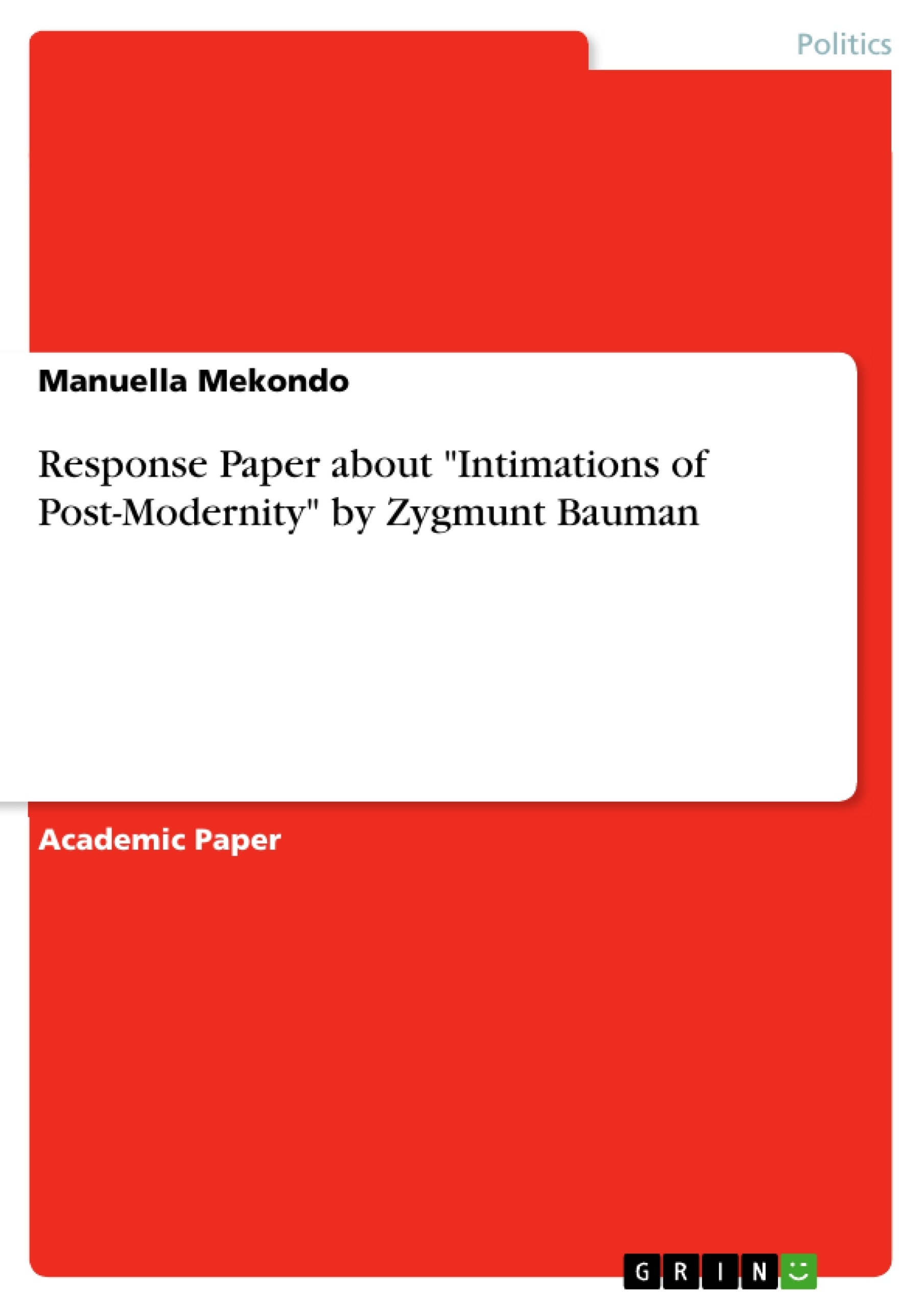Thomas Hobbes in Leviathan asserts that; “For there is no such thing as perpetual Tranquility of mind, while we live here; because Life itself is but Motion, and can never be without Desire, nor without Fear, no more than without Sense”. It can be argued that an illusion of this tranquility is dependent on the state of mind one decides to embrace. Postmodernity is one among others. The postmodernist mind has been criticized for the critical and demolishing eye it uses to approach the issues of society.
In Intimations of Postmodernity (2003) – INTRODUCTION: The re-enchantment of the world or, how can one narrate postmodernity? Zygmunt Bauman presents postmodernity as an ideology that seeks above all to “destroy truth to find truth”. It rejects absolutism but rather engages in constant deconstruction of past, present and future truths, standards and ideals. Bauman explains that postmodernity claims to restore truths eroded by modernity.
Inhaltsverzeichnis (Table of Contents)
- INTRODUCTION: The re-enchantment of the world or, how can one narrate postmodernity?
Zielsetzung und Themenschwerpunkte (Objectives and Key Themes)
This paper aims to provide an overview of Zygmunt Bauman's concept of postmodernity as presented in his work, "Intimations of Postmodernity." Bauman argues that postmodernity seeks to "destroy truth to find truth" by rejecting absolute truths and engaging in constant deconstruction of past, present, and future ideals.
- The nature and characteristics of postmodernity
- The relationship between modernity and postmodernity
- The impact of postmodernity on individual agency and moral responsibility
- The role of "imagined communities" in a postmodern world
- The challenges and dilemmas of moral choice in a postmodern context
Zusammenfassung der Kapitel (Chapter Summaries)
- INTRODUCTION: The re-enchantment of the world or, how can one narrate postmodernity?: Bauman introduces postmodernity as an ideology that aims to "destroy truth to find truth" by rejecting absolutism and engaging in constant deconstruction of truths, standards, and ideals. He contrasts postmodernity with modernity, which he characterizes as a system that seeks to establish controlled pathways for reasoning and rejects diversity. Bauman argues that modernity's pursuit of certainty and orderliness ultimately led to a sense of confinement, a "long march to prison."
Schlüsselwörter (Keywords)
Key terms and concepts explored in Bauman's work include: postmodernity, modernity, deconstruction, truth, imagined communities, individual agency, moral responsibility, ethical uncertainty, inter-communal hostility, tolerance, globalization, and new wars.
Frequently Asked Questions
What is Zygmunt Bauman's view on postmodernity?
Bauman presents postmodernity as an ideology that seeks to "destroy truth to find truth," rejecting absolutism in favor of constant deconstruction.
How does postmodernity differ from modernity according to Bauman?
Modernity is described as a system seeking order and certainty, while postmodernity embraces diversity and deconstructs the rigid pathways established by modern reasoning.
What are "imagined communities" in the postmodern context?
The paper explores the role of imagined communities and their impact on social relations and inter-communal hostility in a postmodern world.
Does postmodernity affect moral responsibility?
Yes, the work investigates the challenges and dilemmas of moral choice and individual agency within a context of ethical uncertainty.
What does the phrase "destroy truth to find truth" mean?
It refers to the postmodern practice of questioning and deconstructing established standards and ideals to uncover a more nuanced understanding of reality.
- Citation du texte
- Manuella Mekondo (Auteur), 2022, Response Paper about "Intimations of Post-Modernity" by Zygmunt Bauman, Munich, GRIN Verlag, https://www.grin.com/document/1298898



